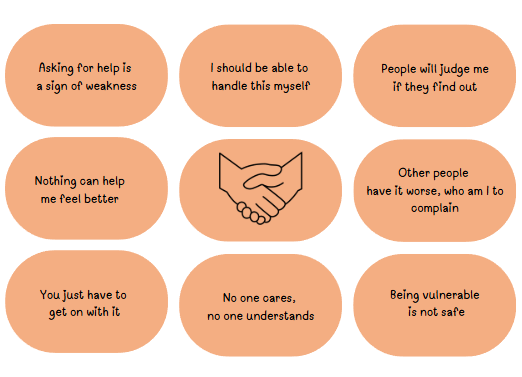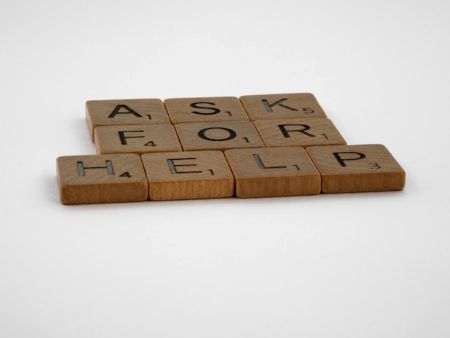
Before I became a coach, I suffered for a very long time in my own space saying some of the very things you can see above. How many of you can relate to some of these yourself? These things that we say to ourselves that stop us from getting the help we desperately need to navigate through life’s ups and downs are our own limiting beliefs. They are thoughts we begin to accept as facts even if they are not true and therefore end up shaping our actions.
So where are these limiting beliefs about seeking help coming from? There are so many factors that contribute to these thoughts coming into our mind and over a period getting reinforced and strengthened. Lets look at some of these:
1. Family’s Belief System & Upbringing
- We borrow our beliefs from our family, particularly our parents or those involved in our direct upbringing. Messages that children hear in the family, like ‘don’t be so sensitive’, ‘don’t be a cry baby’, ‘we shouldn’t talk about these things outside the family’, ‘your generation is weak, in my time…’, teach them that emotional expression is unsafe or a sign of being weak.
- If children see their caregivers not being open to emotional sharing, or always trying to portray that they don’t need help, they associate not taking help with being strong while taking help as being weak or not being capable.
- Over critical caregivers also lead to children developing a negative association of vulnerability. To be seen means they are over-exposed and that is not safe and so it is best to hide in their shell.
2. Cultural & Societal Norms
- Open emotional expression in some cultures is still discouraged. Cultural values or ideas like honour, pride, family reputation, self-reliance & independence, enduring hardship without complain, men don’t cry, emotions are for the weak, become a hindrance to sharing and seeking support.
- There is still a stigma around mental health in many cultures and instead of getting help, we are encouraged to hide it. Have you ever noticed how people sometimes lower their voices to say the words like depression, trauma, mental illness, breakdown, therapy and so many other related words? Why? Because there is an association of embarrassment and shame around them.
3. Schools & Peer Influences
- Many schools still don’t focus on teaching the importance of mental health or having a robust support system where students feel they can safely open up. School curriculums don’t have programs that support mental wellbeing or teach children ways of coping. Students are taught multiple subjects and are expected to perform well in each but not given any tools to manage the pressure they may feel as a result. They just learn to get on with it.
- Focus on discipline over dialogue reinforces that expression can lead to consequences. Not saying that everyone should be allowed to say whatever whenever. There is a place for discipline and a place for dialogue and both need to be balanced and encouraged to nurture the young spirits.
- Schools also often become a place where bullying and peer judgement reinforce the feelings of not wanting to be seen to feel safe.
- The desire to fit in and belong in peer groups teach children early on to hide their true feelings.
4. Media Influences
- Media can shape silent rules about emotions. Often toughness is glorified while mental illness is dramatised – heroes are often portrayed as emotionally strong and vulnerability as a moment of weakness.
- Social media is a platform to share the best version of oneself and not the real person going through the ups and downs of life. People will readily share how happy they are but never how sad they feel. And even if they do share about their struggles, they may be dismissed for oversharing or fishing for attention and be shut down to share ever again.
5. Work Environment
- Performance and competition driven environments rarely allow people to share how they truly feel. Feeling overwhelmed or struggling to cope can be seen as being weak or incapable. Although many organizations now are focusing on wellbeing, how many people feel comfortable about seeking emotional help in that environment is another question. Ultimately the culture of performance appraisal drives people and that only encourages them to keep pushing through.
- Just like bullying in school does, bullying in workplaces can shut people down from sharing or getting any support.
6. Personal Experiences
- It takes courage to get past negative thoughts, fears and voices to seek help sometimes. And if we then feel we have been rejected, misunderstood, taken advantage of or dismissed, our only take away is that asking for help is the worst idea and being vulnerable is opening yourself to getting hurt by other people. Such experiences shut off people in their own shell forever.
- Choosing the wrong person or support system to get the help we need, can scar the experience for the future. The feeling of hopelessness becomes even stronger. And to add to that if someone close to us who doesn’t believe in seeking help says ‘I told you so’, can be a dangerous combination as its leaves one feeling both disappointed and brings in a feeling of shame.
From the stages of being a toddler to an adult, we have so much telling us that it is a bad idea to seek help, that it becomes even more difficult to break free from our limiting beliefs and get help.
But at what cost?
Why do we wait to get help until we are so scarred?!
Not seeking help is a false sense of safety from the outside world while our internal world is slowly collapsing. Getting the right help is ensuring our internal world becomes so strong that no matter how much our outside world collapses, we stand tall.
I get that it’s not easy. But when we understand that these voices inside our head that are telling us to not try are only our own limiting beliefs, when we can see where we have picked them up from and distinguish between the truth and our fears, we can begin to change that voice.

I fought that voice and got help, today I help people find their true voice. Why? Because it changed my life. Are you ready to change yours – to something better, more beautiful and stronger?
If this resonates with you, I work with people who are committed to their happiness, who want to work towards feeling better, stronger and confident, who have the courage to seek help to reclaim their balance, purpose and joy in life.
For more information connect on:
Main – Photo by Rémi Walle on Unsplash



